
October 3
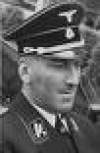
1903 Birth: Ernst Kaltenbrunner: fanatical Austrian Nazi and leading police official who will succeed Reinhard Heydrich as Chief of the Reich Main Security Office (RSHA) in 1943. He will hang at Nuremberg on October 15, 1946.


Composition exercises in drawing. First day: expulsion from paradise, etc. Second day: episode from the deluge, etc. The following took the test with insufficient results, or were not admitted: Adolf Hitler, Braunau a. Inn, April 20, 1889, German Catholic. Father civil servant. 4 classes in Realschule. Few heads. Test drawing unsatisfactory.

Now I was in the fair city for the second time, waiting with burning impatience, but also with confident self-assurance, for the result of my entrance examination. I was so convinced that I would be successful that when I received my rejection, it struck me as a bolt from the blue. Yet that is what happened. When I presented myself to the rector, requesting an explanation for my non-acceptance at the Academy's school of painting, that gentleman assured me that the drawings I had submitted incontrovertibly showed my unfitness for painting, and that my ability obviously lay in the field of architecture; for me, he said, the Academy's school of painting was out of the question, the place for me was the School of Architecture.
It was incomprehensible to him that I had never attended an architectural school or received any other training in architecture.
Downcast, I left von Hansen's magnificent building on the Schillerplatz, for the first time in my young life at odds with myself. For what I had just heard about my abilities seemed like a lightning flash, suddenly revealing a conflict with which I had long been afflicted, although until then I had no clear conception of its why and wherefore. In a few days I myself knew that I should some day become an architect. To be sure, it was an incredibly hard road; for the studies I had neglected out of spite at the Realschule were sorely needed. One could not attend the Academy's architectural school without having attended the building school at the Technical, and the latter required high-school graduation. I had none of all this. The fulfillment of my artistic dream seemed physically impossible.
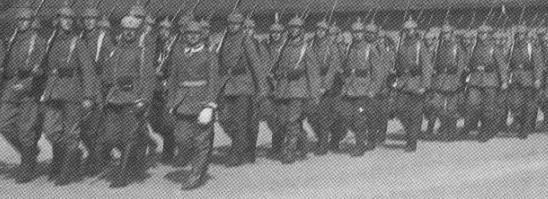

Dead and buried everywhere . . . . We fell from shell hole to shell hole. Multicolored flares arched heavenwards and burst into countless streams. This was always the moment after which we leapt for another freshly turned-up crater in which to disappear . . . . Shrapnel, filth and iron rained mercilessly down on us. The blood almost stagnated in my arteries ... it could only be a few seconds longer - then, yes, then an armored-steel force ripped at bodies already scratched and torn . . . . My nerve failed. I just wanted to lie where I was, I sank hopelessly into insupportable apathy . . . . Then Hitler spoke kindly to me, gave me words of encouragement, said that someday all our heroism would be rewarded a thousand fold in the Fatherland . . . . We returned ... uninjured. Our faces were no longer recognizable. 31
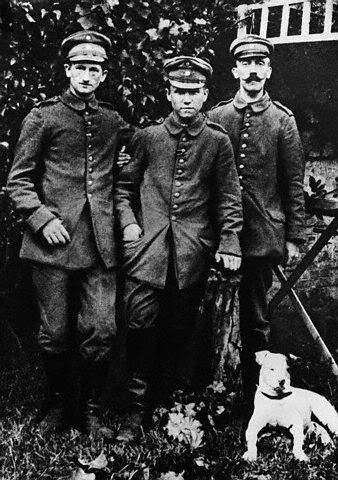
Schmidt, Amann, Hitler, Fuchsl]
1917 World War I: Various War Revenue Act passed in U.S:
On October 3, 1917, six months after the United States declared war on Germany and began its participation in the First World War, the U.S. Congress passes the War Revenue Act, increasing income taxes to unprecedented levels in order to raise more money for the war effort.
[For further details, Click here]
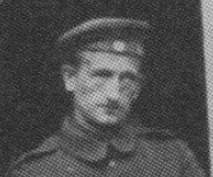
1918 World War I: Various: Germany forms a parliamentary government with Prince Max von Baden as its head: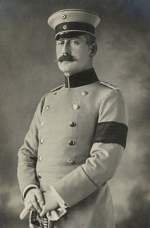
The High Command insists on the immediate issue of a peace offer to our enemies in accordance with the decision of Monday, September 29, 1918. In consequence of the collapse of the Macedonian front, and the inevitable resultant weakening of our reserves in the West, and also the impossibility of making good the heavy losses which have occurred during the battles of the last few days, there is no prospect, humanly speaking, of forcing our enemies to sue for peace. The enemy, on the other hand, is continuing to throw fresh reserves into the battle. The German army still stands firm and is defending itself against all attacks. The situation, however, is growing more critical daily, and may force the High Command to momentous decisions. In these circumstances it is imperative to stop the fighting in order to spare the German people and their allies unnecessary sacrifices. Every day of delay costs thousands of brave soldiers their lives. VON HINDENBURG.
Austria sues for peace: Food shortages in Vienna have become so severe that thousands are starving to death.
[See: Austria: The Other Germany.]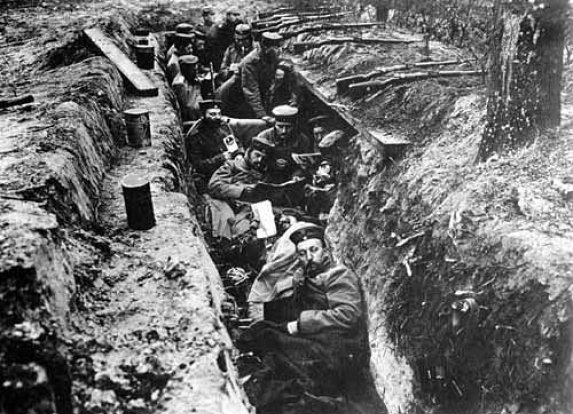
Bulgaria: Following his armed forces' defeat by the Allied Powers, Bulgarian Tsar Ferdinand I abdicates in favor of his son, Boris III. [For further information, click here]
1929 Various:
Death: Gustav Stresemann:
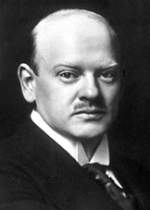
Gustav Stresemann, the son of a innkeeper, was born in Berlin on 10th May, 1878. Stresemann attended universities in Berlin and Leipzig where he studied history, literature and economics.
After completing his studies he worked for the German Chocolate Makers Association. In 1902 he founded the Saxon Manufacturers' Association and the following year joined the National Liberal Party. A right-wing party, Stresemann emerged as one of the leaders of the more moderate wing who favoured an improvement in social welfare provision.
In 1908 Stresemann was elected to the Reichstag. He soon came into conflict with his more conservative colleagues and he was ousted from the party's executive committee in 1912. Later that year he lost his seat in Parliament.
Stresemann returned to business life and was the founder of the German-American Economic Association. A strong advocate of German imperialism, he aliened himself with the political views of Alfred von Tirpitz and Bernhard von Bulow.
He returned to the Reichstag in 1914. Exempted from military service during the First World War because of poor health, Stresemann was a passionate supporter of the war effort and advocated that Germany should take possession of land in Russia, Poland, France and Belgium.
During the war Stresemann became increasing right-wing in his views and his opponents claimed he was the parliamentary spokesman for military figures such as Paul von Hindenburg and Erich Ludendorff. He became increasingly critical of Bethmann Hollweg and advocated unrestricted submarine warfare against the Royal Navy.
In 1918 Stresemann formed the German People's Party. After Germany's defeat Stresemann was sympathetic to the Freikorps and welcomed the defeat of the socialists and communists in the German Revolution. However, he became increasingly concerned by the use of violence of the right-wing groups and after the murders of Matthias Erzberger and Walther Rathenau, Stresemann decided to argue in favour of the Weimar Republic.
With the support of the Social Democratic Party Stresemann became chancellor of Germany in 1923. He managed to bring an end to the passive resistance in the Ruhr and resumed payment of reparations. He also tackled the problem of inflation by establishing the Rentenbank.
Stresemann was severely criticized by members of the Social Democratic Party and Communist Party over his unwillingness to deal firmly with Adolf Hitler and other Nazi Party leaders after the failure of the Beer Hall Putsch. Later that month the socialists withdrew from Stresemann's government and he was forced to resign as chancellor.
In the new government led by Wilhelm Marx, Stresemann was appointed as foreign minister. He accepted the Dawes Plan (1924) as it resulted in the French Army withdrawing from the Ruhr. Under Hans Luther Stresemann's skilled statesmanship led to the Locarno Treaty (December, 1925), the German-Soviet Treaty (April, 1926) and Germany joining the League of Nations in 1926. Later that year he was awarded the Nobel Peace Prize.
Gustav Stresemann negotiated the Young Plan but soon after that he suffered two strokes and on 3rd October, 1929 he died of a heart attack. (Spartacus)
The Kingdom of Serbs, Croats and Slovenes officially changes its name to Yugoslavia.
1932 Iraq wins independence:
With the admission of Iraq into the League of Nations, Britain terminates its mandate over the Arab nation, making Iraq independent after 17 years of British rule and centuries of Ottoman rule.
Britain seized Iraq from Ottoman Turkey during World War I and was granted a mandate by the League of Nations to govern the nation in 1920. A Hashemite monarchy was organized under British protection in 1921, and on October 3, 1932, the kingdom of Iraq was granted independence. The Iraqi government maintained close economic and military ties with Britain, leading to several anti-British revolts. A pro-Axis revolt in 1941 led to a British military intervention, and the Iraqi government agreed to support the Allied war effort. In 1958, the monarchy was overthrown, and for the next two decades Iraq was ruled by a series of military and civilian governments. In 1979, General Saddam Hussein became Iraqi dictator; he held onto power with an iron fist, until disappearing in the face of an American-led coalition's invasion of Iraq in 2003. (History.com)
1933 Various: Austria: An assassination attempt is made against Chancellor Dollfuss:
Although a variety of political labels have been applied to the Dollfuss regime, it eludes simple classification. Its ideology harked back to early religious and romantic political critiques of liberal democracy and socialism. The regime incorporated many elements of European fascism, but it lacked two features widely viewed as essential to fascism: adherence to the 'leadership principle,' and a mass political base.
Palestine: A British court indicts ten Brit ha-Biryonim (Covenant of Terrorists) members in the Arlosoroff murder. (THP)
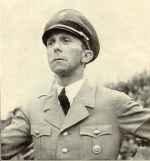
1934 Holocaust: Goebbels warns the Juedische Rundschau (Jewish Review) to limit its articles to Zionist affairs, or it will be shut down. (THP)
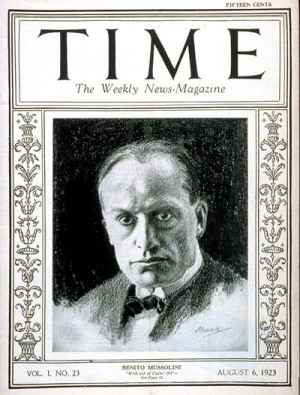
1935 Abyssinia (Ethiopia): Oct 3-4 Mussolini's Italian troops invade the African nation of Abyssinia (Ethiopia), sending in forces from Italian Eritrea and Somaliland. Italy had unsuccessfully attempted to conquer Ethiopia in 1896, and that defeat still rankled with many Italians.
1938 Munich Conference: The Fourth Meeting of the International Commission, composed of the Secretary of State in the German Foreign Office, the British, French and Italian Ambassadors accredited in Berlin, and a representative of the Government of Czechoslovakia, takes place:
The Czechoslovak delegate informed those present at the meeting that the incidents In Krumau had been caused by a fight between Germans belonging to various political trends after the evacuation of the place by Czechoslovak troops. If such a thing occurred again, the observers provided for in paragraph 2 of the minutes of subcommittee A could ascertain the causes.
1939 World War II: German Ambassador in the Soviet Union (Schulenburg) to German Foreign Office:
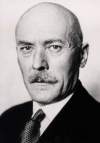
Molotov summoned me to his office at 2 PM today, in order to communicate to me the following: The Soviet Government would tell the Lithuanian Foreign Minister, who arrives today, that, within the framework of an amicable settlement of mutual relations (probably similar to the one with Estonia), the Soviet Government was willing to cede the city of Vilna and its environs to Lithuania, while at the same time the Soviet Government would indicate to Lithuania that it must cede the well-known portion of its territory to Germany. Molotov inquired what formal procedure we had in mind for carrying this out. His idea was the simultaneous signing of a Soviet-Lithuanian protocol on Vilna and a German-Lithuanian protocol on the Lithuanian area to be ceded to us. I replied that this suggestion did not appeal to me. It seemed to me more logical that the Soviet Government should exchange Vilna for the strip to be ceded to us and then hand this strip over to us. Molotov did not seem quite in accord with my proposal but was willing to let me ask for the viewpoint of my Government and give him a reply by tomorrow noon. Molotov's suggestion seems to me harmful, as in the eyes of the world it would make us appear as "robbers" of Lithuanian territory, while the Soviet Government figures as the donor. As I see it, only my suggestion enters into consideration at all. However, I would ask you to consider whether it might not be advisable for us, by a separate secret German-Soviet protocol, to forego the cession of the Lithuanian strip of territory until the Soviet Union actually incorporates Lithuania, an idea on which, I believe, the arrangement concerning Lithuania was originally based." "I informed Molotov in detail of the contents of your instruction. Molotov stated that the Soviet Government shared our trend of thought and was proceeding in that direction. However, it appeared that Turkey had already become rather closely involved with England and France. The Soviet Government would continue to try to rectify or "neutralize" matters in our sense. The Afghan Ambassador, with whom I spoke today, claimed to know that the Soviet Government demanded of Turkey absolute neutrality and the closing of the Straits. Molotov himself said that the negotiations were still under way. When I mentioned the rumors that England and France intended to assault Greece and overrun Bulgaria in order to set up a Balkan front, Molotov asserted spontaneously that the Soviet Government would never tolerate pressure on Bulgaria.
1940 The US Army adopts airborne, or parachute, soldiers. Airborne troops are later used in World War II for landing troops in combat and infiltrating agents into enemy territory.
1941 World War II: Various:
Barbarossa:
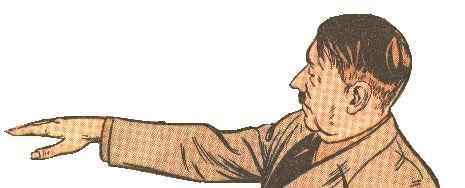
Hitler tells the German people that Russia, 'the enemy in the East,' is broken and will never rise again:
German men and women, if I speak today again after many long months to you it is not to reply to one of those statesmen who recently wondered why I had been silent for such a long time. Posterity will one day be able to weigh up which was more important in the past three and a half months, the speeches of Churchill or my actions.
[See: Was Adolf Hitler an Insecure Dictator?]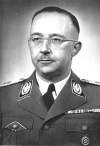
Holocaust: Himmler tours Kiev. It is not known whether or not Himmler included Babi Yar on his tour. (THP) Himmler: "Germanic man can only live in a climate suited to his needs and in a country adapted to his character, where he will feel at home and not be tormented by homesickness."
Stalin to FDR:

I have no doubt that you will do all that is necessary to ensure implementation of the Moscow Conference decisions as speedily and fully as possible, all the more because the Hitlerites will certainly try to use the winter months for exerting maximum pressure upon the USSR at the front. Like you, I am confident of final victory over Hitler for the countries now joining their efforts to accelerate the elimination of bloody Hitlerism, a goal for which the Soviet Union is now making such big and heavy sacrifice.
1942 World War II: Various:
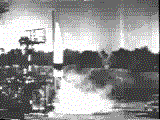
On this day in 1942, German rocket scientist Wernher von Braun's brainchild, the V-2 missile, is fired successfully from Peenemunde, as island off Germany's Baltic coast. It traveled 118 miles. It proved extraordinarily deadly in the war and was the precursor to the Intercontinental Ballistic Missiles (ICBMs) of the postwar era.
German scientists, led by von Braun, had been working on the development of these long-range missiles since the 1930s. Three trial launches had already failed; the fourth in the series, known as A-4, finally saw the V-2, a 12-ton rocket capable of carrying a one-ton warhead, successfully launched.
The V-2 was unique in several ways. First, it was virtually impossible to intercept. Upon launching, the missile rises six miles vertically; it then proceeds on an arced course, cutting off its own fuel according to the range desired. The missile then tips over and falls on its target-at a speed of almost 4,000 mph. It hits with such force that the missile burrows itself into the ground several feet before exploding. It had the potential of flying a distance of 200 miles, and the launch pads were portable, making them impossible to detect before firing.
The first launches as part of an offensive did not occur until September 6, 1944 when two missiles were fired at Paris. On September 8, two more were fired at England, which would be followed by more than 1,100 more during the next six months. More than 2,700 Brits died because of the rocket attacks.
After the war, both the United States and the Soviet Union captured samples of the rockets for reproduction—they also captured the scientists responsible for their creation. (History.com)

One of the most important tasks was the development of new weapons and their serial production . . . From the point of view of their technical production the rockets were a very expensive affair for us, and their effect, compared to the cost of their output, was negligible. In consequence we had no particular interest in developing the affair on a bigger scale. The person who kept urging it was Himmler, in this case. He gave one Obergruppenfuehrer Kammler the task of firing off these rockets over England. In Army circles they were of the same opinion as I, namely, that the rockets were too expensive; and in Air Force circles, the opinion was the same, since for the equivalent of one rocket one could almost build a fighter. It is quite clear that it would have been much better for us if we had not gone in for this nonsense.
[See: Wunderwaffen: Hitler's Deception and the History of Rocketry.]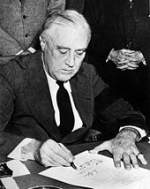
FDR establishes the Office of Economic Stabilization and authorizes controls on farm prices, rents, wages and salaries.
1944 World War II: German troops evacuate Athens, Greece:
The communists, so the story went, did not like the government that Greece had acquired soon after it was liberated from German occupation and started fighting against it. Thankfully, the British army, which helped to free Greece from its Nazi occupiers, fought and defeated the communists, who—the story continued—had killed many innocent civilians while trying to seize power. The communists then persisted in trying to overthrow the government despite their defeat in Athens, but a few years later they eventually gave up.
1945 Various The World Federation of Trade Unions is formed:
The delegates, including representatives of the American Congress of Industrial Organizations (CIO) and the Soviet trade unions, agreed to set up a new world federation replacing the old International Federation of Trade Unions (IFTU) and the Red International of Labour Unions (PROFINTERN, 1920-1934), as result of the desire for unity, peace and progress after the Second World War; the development of the cold war and the increasing communist influence in the Executive Committee of the WFTU resulted from 1948 in the departure of the noncommunist organizations, in order to found their own organization in 1949, the International Confederation of Free Trade Unions (ICFTU); the state dominated East European trade unions came to control the WFTU, especially since the Soviet trade unions constituted one-half of the membership.
Wunderwaffen: The British successfully test-fire a captured V-2 at Cuxhaven, burning for nearly 5 minutes, and missing the target by a mile and a half. (Piszkiewicz)
1952 Britain successfully tests A-bomb:
Britain successfully tests its first atomic bomb at the Monte Bello Islands, off the northwest coast of Australia.
During World War II, 50 British scientists and engineers worked on the successful U.S. atomic bomb program at Los Alamos, New Mexico. After the war, many of these scientists were enlisted into the secret effort to build an atomic bomb for Britain. Work on the British A-bomb officially began in 1947, and Los Alamos veteran William Penney served as the program head. In February 1952, British Prime Minister Winston Churchill publicly announced the plans to test a British nuclear weapon, and on October 3 a 25-kiloton device—similar to the U.S. atomic bomb dropped on Nagasaki, Japan—was successfully detonated in the hull of the frigate HMS Plym anchored off the Monte Bello Islands. The test made Britain the world's third atomic power after the United States and the Soviet Union. (History.com)
1990 East and West Germany reunite after 45 years:
Less than one year after the destruction of the Berlin Wall, East and West Germany come together on what is known as "Unity Day." Since 1945, when Soviet forces occupied eastern Germany, and the United States and other Allied forces occupied the western half of the nation at the close of World War II, divided Germany had come to serve as one of the most enduring symbols of the Cold War. Some of the most dramatic episodes of the Cold War took place there. The Berlin Blockade (June 1948--May 1949), during which the Soviet Union blocked all ground travel into West Berlin, and the construction of the Berlin Wall in 1961 were perhaps the most famous. With the gradual waning of Soviet power in the late 1980s, the Communist Party in East Germany began to lose its grip on power. Tens of thousands of East Germans began to flee the nation, and by late 1989 the Berlin Wall started to come down. Shortly thereafter, talks between East and West German officials, joined by officials from the United States, Great Britain, France, and the USSR, began to explore the possibility of reunification. Two months following reunification, all-German elections took place and Helmut Kohl became the first chancellor of the reunified Germany. Although this action came more than a year before the dissolution of the Soviet Union, for many observers the reunification of Germany effectively marked the end of the Cold War. (History.com)
Edited by Levi Bookin (Copy editor) Click to join 3rdReichStudies Disclaimer: This site includes diverse and controversial materials--such as excerpts from the writings of racists and anti-Semites--so that its readers can learn the nature and extent of hate and anti-Semitic discourse. It is our sincere belief that only the informed citizen can prevail over the ignorance of Racialist "thought." Far from approving these writings, this site condemns racism in all of its forms and manifestations.
levi.bookin@gmail.com










Fair Use Notice: This site may contain copyrighted material the use of which has not always been specifically authorized by the copyright owner. We are making such material available in our efforts to advance understanding of historical, political, human rights, economic, democracy, scientific, environmental, and social justice issues, etc. We believe this constitutes a "fair use" of any such copyrighted material as provided for in section 107 of the US Copyright Law. In accordance with Title 17 U.S.C. Section 107, the material on this site is distributed without profit to those who have expressed a prior interest in receiving the included information for research and educational purposes. If you wish to use copyrighted material from this site for purposes of your own that go beyond 'fair use', you must obtain permission from the copyright owner.
Please Note: The list-owner and moderators of 3rdReichStudies are not responsible for, and do not necessarily approve of, the random ads placed on our pages by our web server. They are, unfortunately, the price one pays for a 'free' website.



